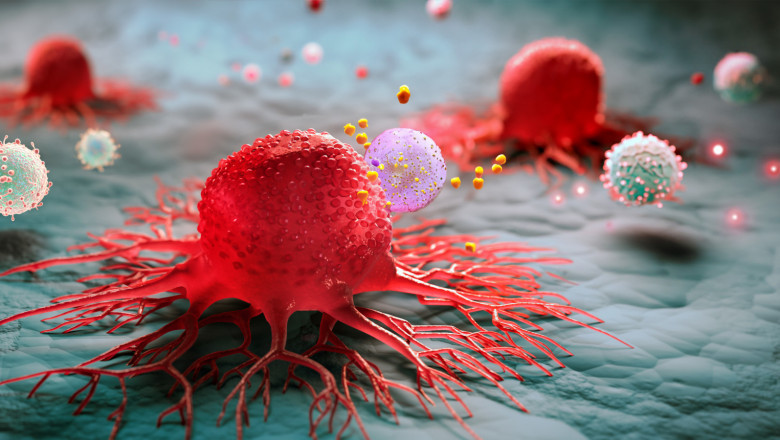views

Cancer remains one of the most complex and deadly health challenges of our time. As we look to the year 2050, both concern and hope lie ahead. While cancer cases are projected to rise significantly, revolutionary progress in science and technology is expected to transform how we detect, treat, and prevent this multifaceted disease.
This guide explores the future of cancer in 2050, highlighting predictions backed by science, expert projections, and emerging research.
📈 1. A Surge in Cancer Cases Globally
The World Health Organization estimates that the global cancer burden will reach over 28 million cases annually by 2040, and this number may be even higher by 2050. The key contributors include:
-
Aging Population: Cancer risk increases with age. By 2050, the global population over age 60 is expected to double.
-
Urbanization and Lifestyle: Poor diet, sedentary lifestyles, alcohol consumption, smoking, and stress remain major risk factors.
-
Pollution and Environmental Exposure: Air, soil, and water pollution may continue contributing to higher rates of lung, breast, and gastrointestinal cancers.
-
Global Inactivity: With increasing automation, daily physical activity levels are decreasing, indirectly raising cancer risk.
🔬 2. Cancer Will Be Detected Earlier Than Ever Before
One of the most promising developments is early-stage detection. By 2050, experts believe we will diagnose most cancers before symptoms ever appear, thanks to:
🔍 Liquid Biopsies
These non-invasive blood tests will detect fragments of cancer DNA (circulating tumor DNA) long before a tumor forms or spreads. This will make early intervention far more likely and increase survival rates.
🧠 AI-Powered Imaging
Artificial intelligence will read CT scans, MRIs, and X-rays with near-perfect accuracy, identifying tumors as small as a grain of rice, sometimes years before current methods.
📱 Wearable Devices
Smartwatches and wearable biosensors will continuously track biological markers like:
-
Inflammation levels
-
Genetic mutations
-
Hormone shifts
-
Heart rate and blood oxygen levels (which may indicate tumors)
🧬 3. Precision and Genomic Medicine Will Be Standard
Cancer treatment in 2050 will no longer be generalized. Instead, every patient’s treatment will be customized based on their individual genetics, lifestyle, tumor biology, and immune response.
What to Expect:
-
Tumor Sequencing: Doctors will decode the genetic makeup of every cancer to prescribe the most targeted therapies.
-
Pharmacogenomics: Medications will be tailored to your DNA for maximum effectiveness and minimal side effects.
-
Immunotherapy Advancements: Immune-based treatments like CAR-T therapy will be refined and widely available.
Instead of "chemo for all," treatments will be as unique as fingerprints.
💉 4. Cancer Vaccines Will Be Real—and Life-Changing
By 2050, we may see a new wave of therapeutic and preventive cancer vaccines, including:
-
Breast and prostate cancer vaccines
-
Pancreatic and colon cancer vaccines
-
mRNA vaccines that train your immune system to attack cancer cells (building on COVID-19 vaccine technology)
Some vaccines will be custom-made from the patient’s own tumor cells, offering personalized immunity.
⚙️ 5. Artificial Intelligence Will Guide Every Step
AI won't just detect cancer—it will help design treatment plans, predict patient outcomes, and monitor patients in real time.
Applications by 2050:
-
AI-generated drug development will drastically reduce the time needed to create new medications.
-
Digital twin models will simulate your body’s response to a treatment before you actually take it.
-
Robotic surgeons guided by AI will perform ultra-precise, minimally invasive procedures with faster recovery times.
🌍 6. Environmental & Social Factors Will Still Be Major Challenges
While technology will advance rapidly, global health inequality and environmental change may still increase cancer risk:
-
Poor countries may lag in accessing precision medicine and early diagnostics.
-
Air and water pollution will remain contributors to rising cancer rates, especially in urban or industrial zones.
-
Climate change could indirectly increase cancer by disrupting food systems and promoting stress-related illnesses.
Global health organizations must focus on making care accessible and affordable to truly reduce the worldwide burden.
🧠 7. Cancer May Become a Manageable Chronic Disease
Here’s a hopeful vision: Cancer in 2050 may not be cured—but it may be managed like diabetes or hypertension.
This means:
-
Lifelong medication or monitoring may keep cancer under control.
-
Regular scans and biomarkers will track tumor dormancy.
-
Some patients may live for decades with cancer, without serious symptoms.
🧓 8. Special Care for Older Adults
With a larger aging population:
-
Geriatric oncology will rise, blending cancer care with age-related issues like frailty, cognitive decline, and multiple chronic conditions.
-
Treatment protocols will focus on quality of life, not just aggressive survival.
🧪 9. Cancer Research Will Become Hyper-Personal and Collaborative
Cancer research will no longer be isolated by country or institution. By 2050, expect:
-
Global genomic databases storing billions of cancer case studies
-
AI platforms used by researchers across continents
-
Citizen science contributions from patients and caregivers through data-sharing apps
This will speed up discovery and promote faster clinical breakthroughs.
🌟 Final Thoughts: A Future With More Hope
While the number of cancer cases may rise in 2050, the outlook is brighter than ever. With personalized medicine, smart diagnostics, AI tools, and cancer vaccines on the horizon, we may soon see a world where cancer is no longer a leading cause of death—but a condition that can be managed, treated, or even prevented.
💬 Stay Informed, Stay Empowered
Understanding where cancer care is headed helps us prepare for the future and make smarter choices today. If you or a loved one is affected by cancer, know that innovation, science, and global cooperation are paving the way for better days.












Comments
0 comment